If you think you can do a thing, or think you can’t do a thing, you’re right. – Henry Ford
—————
Do I have what it takes?
So you’re thinking about taking a long Outward Bound course. Maybe you’re wondering, “Can I do it? Do I have what it takes to do a long course? What will it be like in the wilderness?”
If you’re considering a long Outward Bound course, [Semester, Intercept, or Instructor Development Courses], these questions are common. It’s natural to wonder how hard it will be if you’ve never done something like this before. The whole idea of Outward Bound is to do something you aren’t sure you can do!
As a long-time Outward Bound field Instructor, I can assure you that you don’t need any special skills when you show up for a long course. You’ll start at the beginning – a very good place to start – and you’ll begin with the A-B-C’s of camping and living in the outdoors: how to pack your backpack or canoe bags, how to cook over a stove or camp fire, how to navigate in the wilderness and how to stay safe and comfortable, whatever the weather.
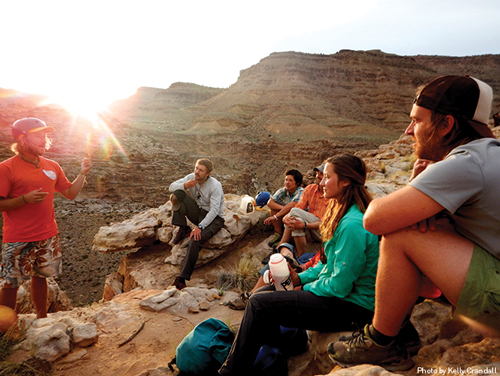
If you’ve never done a long Outward Bound course, our Instructors will teach you the necessary wilderness skills to live in the outdoors.
Outward Bound’s methodology is to build on experience and success. While you’ll arrive a beginner, you will soon develop confidence in yourself and your new skills. Before long you’ll be a master at cooking over a camp stove, organizing your gear in your backpack for the day or belaying your teammate up a rock climb (even if you have no idea what the word “belay” means right now!)
Outward Bound courses are meant to be both challenging AND successful. You can assume that everyone on the team will be cheering for you to succeed during your course. You can also count on being challenged; that’s what it’s about.
More to Love
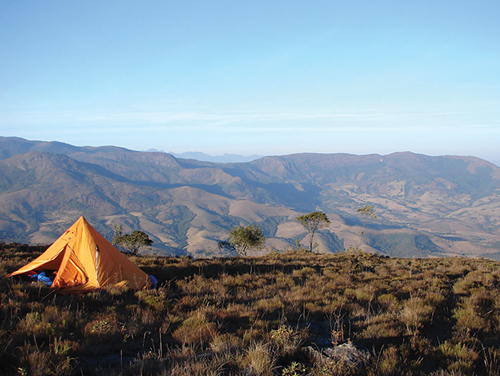
Long Outward Bound courses offer the chance to experience a variety of scenery and terrain.
Long courses are special. On long courses, you have more time to master skills, whether that means river navigation and canoe strokes, map and compass reading or backpacking for stretches at a time. You’ll enjoy a tremendous variety of scenery as you pass through several different types of terrain, whether canyon country, mountains or lakes and rivers. With more days out in nature, you’ll have the chance to witness more brilliant night skies, more wildlife and more wild beauty. You’ll develop a deeper sense of what you are capable of. On a long course, your team has more time to gel, to get past the “getting-to-know-you” stage and to learn to work things out as a team.
How do you get ready for a course that’s a month long, or two, or three?
Here are some tips to help you prepare.
Get in Shape!
Outward Bound courses are meant to be physically challenging. Your days will be active and full. And by the end, you’ll marvel at how strong you feel from being in the wilderness hiking, paddling and climbing just about every day of the course. The more in shape you get ahead of time, the easier the challenges will be when you arrive on course.
If you haven’t been active lately, start with 30 minutes of brisk walking and build up your mileage slowly. Seek hills to build your cardiovascular strength. Try to work up to five mountainous miles at least once a week (as your local terrain allows), and if you can, do more. Participate in an active exercise every day to get your body used to physical activity. Time spent playing tennis or other sports, a walk around a school track and lifting weights at a gym are all great ideas of how to help your body to prepare.
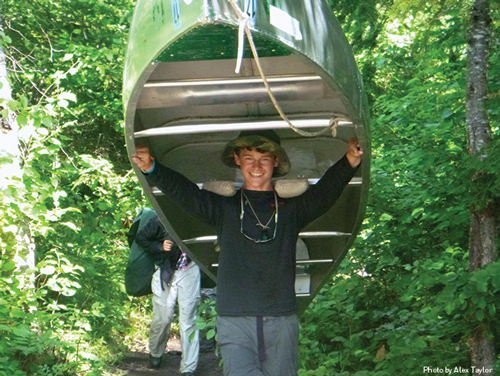
It is helpful to physically prepare for your time in the wilderness by doing regular physical activity before the course.
Carry a Pack
Land-based programs include activities such as hiking, backpacking and sometimes running. To get ready for this type of program, hike with a weighted day pack or backpack, as carrying weight will help your body get used to the backpack. Start with a small amount of weight, around five pounds or so. You can gradually build your endurance by adding more weight, building up to 25 or 30 pounds, and increase your time spent hiking. This will give you a good base of strength and fitness for your course.
Strength training, whether at a gym or using weights at home, is also a favorable option to strengthen your upper body. Again, if you haven’t been doing weights, start gently and build gradually to prevent injury.
Another idea is to climb stairs and increase the number of flights you go up. If you live in a flat place, stairs may be the only option you have to go uphill. I once prepared for a mountaineering trip by climbing 36 flights of stairs with a backpack on, and those training “flights” served me well. I worked up to sets of three times up and down those steps. The expedition was much more interesting than the stairwell, but the steps helped my body prepare.
Get in the Water
Some long courses include sailing, paddling and may include swimming. Build up your swimming strength before you arrive, and the activity on course will come easier. Your course advisor will send recommendations on how to prepare physically, with concrete suggestions tailored to your course. For example, they might suggest you start with 20 minutes of relaxed laps, and then build up gradually to swimming a mile before you arrive.
Break in Those Boots!
It’s crucial to break in your hiking boots. Wear your boots at home, and walk and hike in them. Build up mileage so that your feet feel at home in your boots. If your course includes backpacking or mountaineering, your feet will appreciate all the time you spend getting them ready for your course.
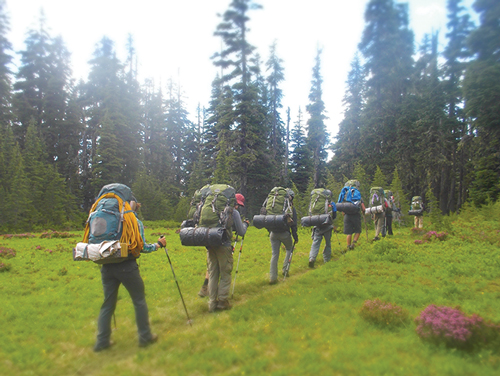
The right equipment is essential for improving your experience on course.
Carry an Open Mind
As you get ready for the course, try to let go of expectations and take an open mind with you. Some of your pre-conceived notions may be correct, but you can be sure that much will be outside of your expectations.
Here’s a short story about expectations, from a fellow Instructor:
“A group had been on a course for a while and most people had taken a couple turns at cooking. However, one man refused to cook. Others encouraged him, but he wasn’t interested. Some people were getting frustrated that he wasn’t doing his share. Some assumed that he didn’t know how to cook and was embarrassed to take part. Finally the group talked to him, and he reluctantly agreed to cook. I knew something was up when I watched him expertly cut the vegetables. The supper that night was extraordinary.
‘I didn’t want others to compare themselves to me,’ the man explained. ‘I wanted everyone to have a chance to be a success in the kitchen. I am a professional chef, and have the chance to cook all the time.”
You never know what’s going on for someone else in your group — what skills they bring, what their personal challenges might be, most likely different from yours. An open mind is a great thing to carry on an Outward Bound course, and it won’t weigh down your pack at all. This is also a great reminder to bring back home with you after a course.
Do a Little More Than Your Share
Living simply in the outdoors takes time. It seems there are always chores that need to be done: gathering and purifying water, cooking, putting up shelters and so much more. Your group will rotate responsibilities, and it’s easy to think, “Well, I’ve done my part.” Consider doing a little extra. Do it often. You may find that you learn more, and gather some good karma along the way.
When Struggling, Help Another
Everyone has their challenging moments on a course. When you find yourself having a hard time, invest in some self care – like tending to blisters or drinking water if dehydrated, and then look around. There’s a good chance that someone else is having a hard time, too. Consider taking a little extra weight in your pack, telling a joke or story, or even starting a song. Helping others will make you feel better. Sometimes being honest about how hard the situation is and feeling that you are in it together is therapeutic.
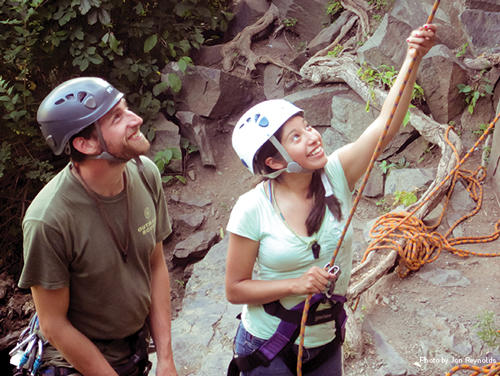
Outward Bound courses emphasize the value of teamwork and connecting with others will enrich your experience in the wilderness.
Be Inclusive
You may find yourself naturally drawn to spend more time with certain people in your group over others. Be sure to take the time to get to know everyone, be curious and help them feel part of the group. This is the role of a good leader, and on a long course you’ll be learning and sharing leadership skills. You’ll find that each person brings their own gifts, making your time spent together all the more valuable.
Bring Your Best Self and Know When to Take Some Space
A long course requires the best you have to give. Prepare yourself mentally. Ask yourself how you want to “show up” when you’re tired or not having a great day. You have the choice to show up with a positive attitude, be a cheerful voice of encouragement when things are rough or act as a good listener to someone who needs it. Be kind to yourself, too, and know that you won’t always be able to be cheerful. It can be a practice, something you work towards and a chance to challenge yourself. Give yourself credit when you’re tempted to complain, but instead look internally to find the strength to be positive.
On long courses, it’s especially important to carve out a little time for yourself once in a while. You’ll be living with a group in the wilderness. People will occasionally get on your nerves, no matter how wonderful they are. There may be times when you feel lonely, tired or feel like giving up. This might be a good time to pull out your journal, count some blessings and check in with yourself about what you need. Sometimes a little time alone can give you perspective and help clear your head.
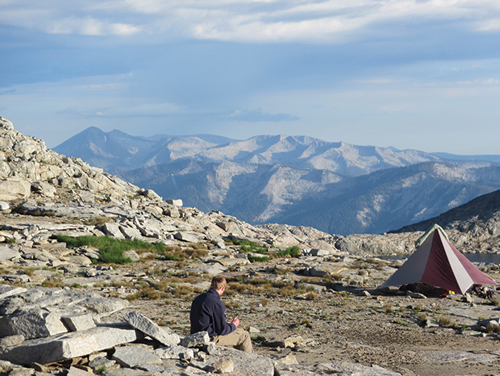
Time spent alone, or going solo, is a great way to get perspective while on course.
Leaving Your Comfort Zone
When you arrive on your course, you’ll start a great journey. You’ll live simply and let go of most creature comforts. Life will have a different rhythm, one more tuned to the natural world, the weather, the moon, stars and sun.
Your Instructors will start at the beginning to help you learn the wilderness basics. There will be hard moments, but you’ll make it through. You may find that some of the hardest moments offer the most powerful lessons and self understanding.
On your course you’ll have the chance to leave your comfort zone and dwell in the place where you begin to change and grow.
A long course is full of opportunities to leave your comfort zone, to see amazing wilderness and experience deep friendships – to stretch yourself in ways you never imagined. Take time to prepare physically and mentally in order to gain the most out of this experience. And rest assured, you can do it!
About the Author
CJ Wilson has instructed Outward Bound courses from Maine to Patagonia. She still appreciates the finer aspects of a good macaroni and cheese dinner prepared over a camp stove. She writes from her base camp in Asheville, NC.
OTHER POSTS YOU MAY LIKE
Read More
Read More
Read More




